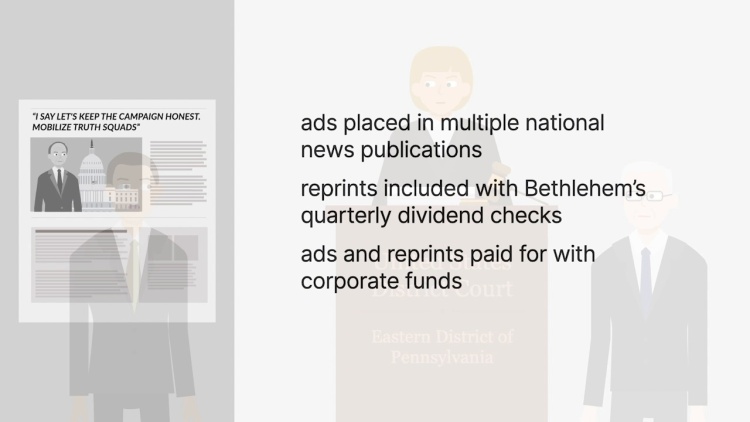Cort v. Ash
United States Supreme Court
422 U.S. 66 (1975)
- Written by Robert Schefter, JD
Facts
Ash (plaintiff) owned 50 shares of stock in Bethlehem Steel, of which Stewart Cort (defendant) was the chairman of the board of directors. In 1972, Cort used corporate funds to pay for advertisements in multiple national news magazines and local newspapers that included his name, picture, and direct quotes urging votes against U.S. presidential candidates who campaigned for higher taxes against businesses. The advertisements were also included in quarterly dividend checks mailed to Bethlehem shareholders and were available at the corporate office. Ash sued Cort in the United States District Court for the Eastern District of Pennsylvania, bringing a private claim for relief under a federal criminal statute that prohibited corporations from making contributions related to any U.S. presidential or vice-presidential election. 18 U.S.C. § 610. The complaint sought injunctive relief to stop future donations, as well as derivative monetary damages for the corporation. The district court granted summary judgment for Cort, and the court of appeals reversed, holding that a private action by a stockholder for derivative damages was proper under 18 U.S.C. § 610. The United States Supreme Court granted certiorari to Cort.
Rule of Law
Issue
Holding and Reasoning (Brennan, J.)
What to do next…
Here's why 899,000 law students have relied on our case briefs:
- Written by law professors and practitioners, not other law students. 47,000 briefs, keyed to 994 casebooks. Top-notch customer support.
- The right amount of information, includes the facts, issues, rule of law, holding and reasoning, and any concurrences and dissents.
- Access in your classes, works on your mobile and tablet. Massive library of related video lessons and high quality multiple-choice questions.
- Easy to use, uniform format for every case brief. Written in plain English, not in legalese. Our briefs summarize and simplify; they don’t just repeat the court’s language.





